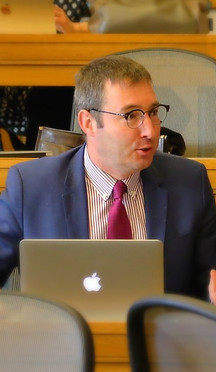- Berthold Beitz Professor in Human Rights, Global Affairs and Philosophy-
- Director of the Carr Center for Human Rights Policy-
John F. Kennedy School of Government, Harvard University
Mathias Risse
Mathias Risse

Mathias Risse is Berthold Beitz Professor in Human Rights, Global Affairs and Philosophy at the John F. Kennedy School of Government at Harvard University and Director of the Carr Center for Human Rights Policy, His work has primarily addressed three sets of topics. To begin with, he has worked extensively on questions of global justice ranging from human rights, inequality, taxation, trade, and immigration to climate change and obligations to future generations. Secondly, he has worked in the philosophy of technology, especially Artificial Intelligence and how its development engages traditional questions about politics. More recently, he has taken a keen interest in indigenous thought around the world. The last two lines of inquiry are driven by a sense that philosophy must adjust its focus in light of existential challenges from climate crisis and technological innovation. We need to rethink our conversations and bring in neglected voices such as indigenous authors. Risse has also worked on questions in ethics, decision theory and 19th century German philosophy, especially Nietzsche. In addition to the Harvard Kennedy School, he regularly teaches in Harvard College, the Graduate School of Design, the Graduate School of Education, and the Harvard Extension School He is affiliated with the Harvard Philosophy Department. He has also been extensively involved with executive education both at Harvard and in collaboration with international organizations.
Risse also serves as Director of the Program on the Ethics of Emerging Technologies at the Edmond J Safra Center for Ethics, as well as Director of the McCloy program, a fellowship program for German students. He is affiliated with the Center for European Studies and the Weatherhead Center for International Affairs.
Risse has long been committed to fostering collaboration among philosophers and representatives of other fields across cultural divides, and has done a fair amount of organizing to this effect around the world. He has been a visiting professor at the National University of Singapore, New York University Abu Dhabi and Leuphana University in Germany. Risse grew up in a village in Westphalia, Germany. He studied in Bielefeld, Pittsburgh, and Jerusalem, and received his PhD from Princeton in 2000. He taught in the Department of Philosophy at Yale before coming to Harvard in 2002.
Education and Career
Risse was born in Paderborn, Germany, passing his Abitur at the Gymnasium Theodorianum in 1990, with specialization in German and English literature. That same year he started studying philosophy and mathematics at the University of Bielefeld (where he worked with Wolfgang Spohn, a philosopher of science and epistemologist, and Rüdiger Bittner, a moral philosopher and Kant specialist), eventually receiving a master’s degree in mathematics (Diplom) there in 1996 with a thesis in game theory supervised by Joachim Rosenmüller. He first came to the United States in 1993 as a visiting scholar in the Department of Philosophy at the University of Pittsburgh, where he worked with moral philosophers Kurt Baier and David Gauthier, with philosophers of science John Earman and Wesley Salmon, as well as with future Nobel Laureate Alvin Roth in economics. The following year he spent at the Hebrew University of Jerusalem, working with future Nobel Laureate Robert Aumann at the Center for Rationality and Interactive Decision Sciences on epistemic foundations of game theory. He entered the PhD program in philosophy at Princeton in 1995 and eventually wrote a thesis on collective rationality under supervision of decision theorist Richard Jeffrey and philosopher-of-mathematics Paul Benacerraf. Having received the PhD in 2000, Risse took a job as Assistant Professor in the Department of Philosophy at Yale that same year. He came to Harvard in 2002 and was promoted to associate professor in 2005 and to full professor in 2010. He became an American citizen in 2008 but kept his German citizenship.
Risse greatly enjoys teaching and over the years has developed or contributed to the development of many different courses in practical ethics, political philosophy, the philosophy of technological, and 19th century German philosophy. At the Kennedy School he regularly offers courses on professional ethics as well as political philosophy with a global orientation. Over the years he has also offered various courses in the general education curriculum of Harvard College, including courses on The Meaning of Life and on Economic Justice. He also teaches a freshman seminar on Nietzsche. In addition, he regularly offers courses on human rights and global governance in the Harvard Extension School. In recent years he has often cross-registered his courses on moral leadership, the philosophy of technology, and indigenous thought with the Graduate School of Education and the Graduate School of Design at Harvard. He also been much involved in with executive education. In particular, he chairs an executive program for Members of the German Parliament (the Bundestag) that the Harvard Kennedy School conducts jointly with the Bosch Foundation, as well as a regular program called Emerging Leaders.